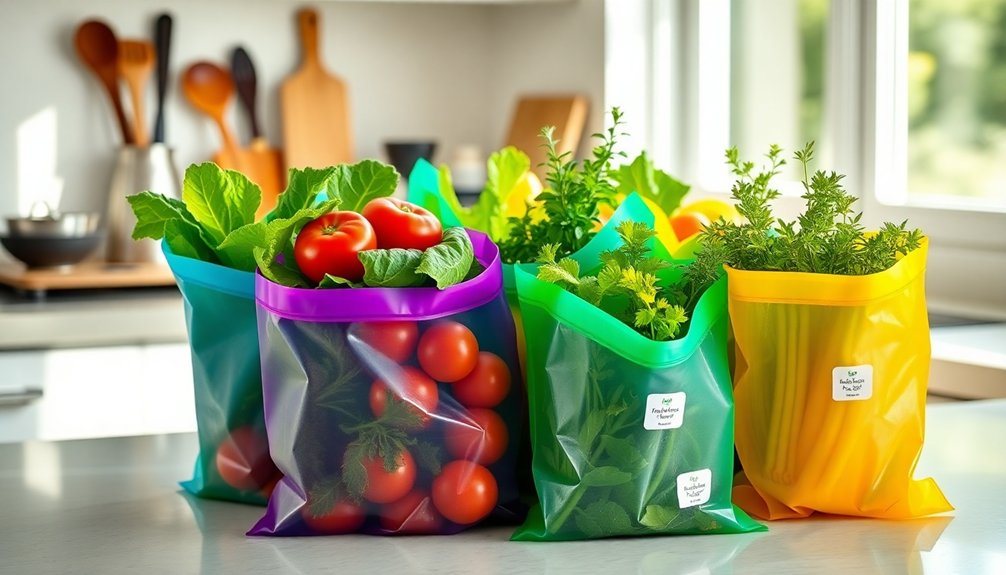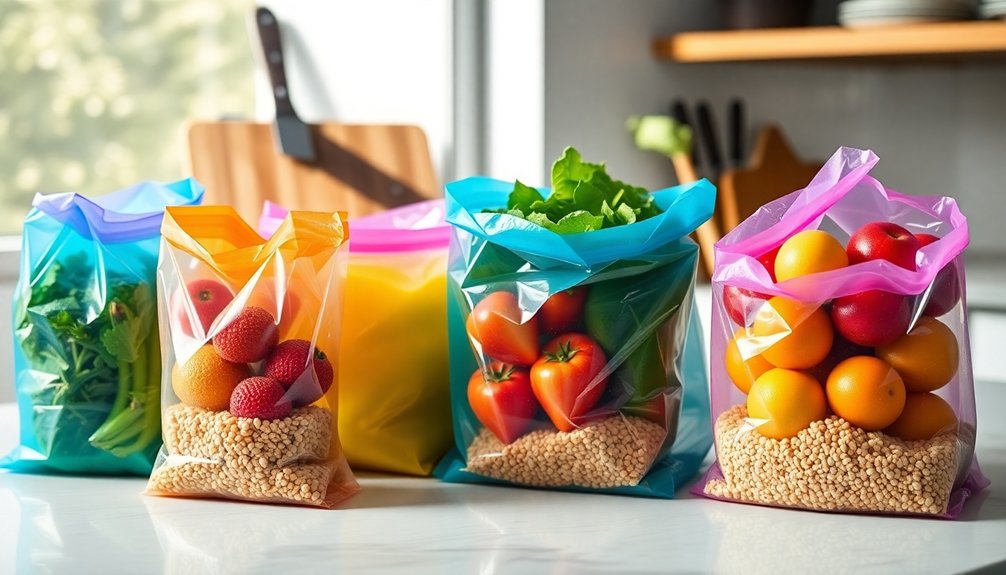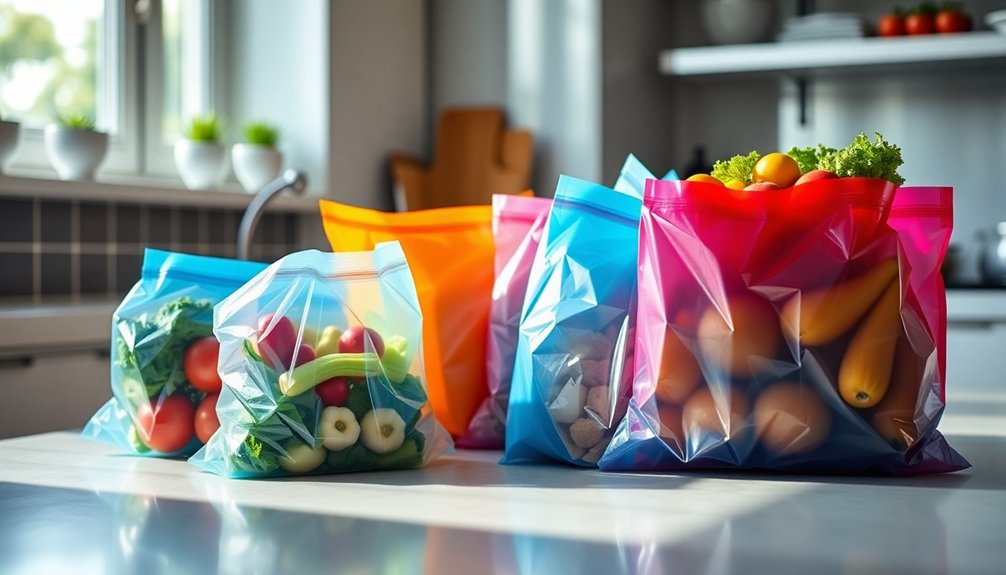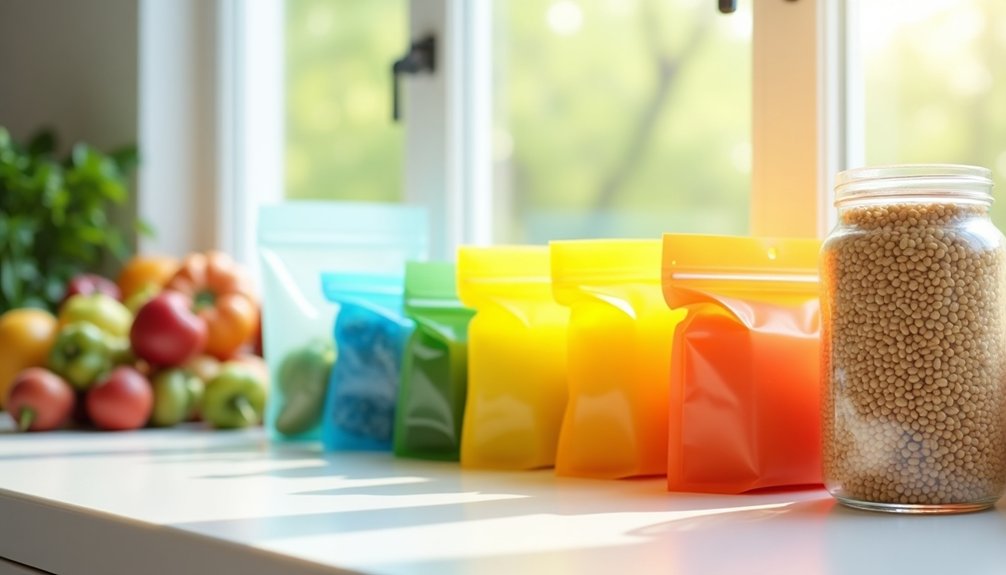Yes, polypropylene bags can be food safe if they comply with safety standards like FDA regulations. These bags are made from non-toxic materials, minimizing harmful chemical leaching. Their moisture resistance keeps food fresh and prevents mold growth. Designed for various food types—like grains, fruits, and vegetables—they're versatile for dry and refrigerated storage. With antimicrobial features to reduce bacteria, they enhance food safety. Plus, many polypropylene bags are recyclable, making them eco-friendly. If you're curious about their practical applications and benefits, you'll find even more insights ahead.
Key Takeaways
- Polypropylene bags comply with FDA regulations and EU standards for food contact safety, ensuring they are safe for food storage.
- The non-toxic nature of polypropylene minimizes the risk of harmful chemical leaching, making them suitable for food packaging.
- These bags exhibit excellent moisture resistance, protecting food from mold and maintaining freshness during storage.
- Polypropylene bags are durable, with high flexural strength and heat resistance, allowing safe storage and even cooking applications.
- Many options are recyclable and eco-friendly, promoting sustainable practices while ensuring food safety.
Safety Standards and Regulations
When it comes to food safety, understanding safety standards and regulations is crucial for both manufacturers and consumers. You need to know that BOPP bags must comply with FDA regulations, particularly the FDA 21 CFR regulations, to ensure they're safe for food contact. Polypropylene (PP) materials, such as those used in food storage containers, have a high melting point and are generally considered safe for food contact with a low risk of chemical leaching. Additionally, if you're in the EU, these bags must meet EU Regulation No. 1935/2004 to be considered food-safe. While food storage bags like BOPP ones are exempt from premarket clearance under the "housewares exemption," they still have to meet general safety provisions. Rigorous testing ensures that these bags are safe for food contact and free from harmful substances.
Manufacturers are responsible for passing inspections by authoritative bodies like the FDA and EU Commission. They must also provide certification to prove compliance with international safety standards.
Even though there are regulatory exemptions, housewares must ensure they don't pose health hazards.
When purchasing these bags, look for labels indicating compliance with FDA regulations, including being free of harmful chemicals like BPA and phthalates.
Material Properties
Polypropylene bags boast a range of material properties that make them ideal for food storage and packaging. One of the standout features is their excellent chemical resistance, which protects your food from acids and bases. Since polypropylene is non-toxic, you won't have to worry about harmful chemicals leaching into your food.
Additionally, these bags are moisture-resistant, preserving your food from damage and mold, and have undergone FDA approval for food contact, ensuring safety and free from harmful BPA.
Durability is another key property; with high flexural strength and fatigue resistance, they can hold heavy loads without tearing. This means you can reuse them multiple times, saving on packaging costs.
Their abrasion resistance ensures they withstand harsh conditions while keeping your food safe.
Flexibility in production allows you to choose various designs, sizes, and thicknesses to fit your specific needs. You can even select breathable options to maintain freshness.
Plus, these bags are recyclable, making them a more environmentally friendly choice. Furthermore, their BPA-free status ensures that you can store food without the risk of harmful chemical exposure.
Practical Applications

When it comes to food storage solutions, polypropylene bags really shine with their versatility and customization options. They have a high melting point of around 160C (320F), ensuring safe and secure storage for various food items. You can use them for everything from grains and flour to fruits and vegetables, ensuring your food stays safe and fresh. Plus, their adaptable design means you can find the right bag for any specific need. Additionally, polypropylene is a nontoxic material, making it an excellent choice for safely packaging food items.
Food Storage Solutions
Effective food storage solutions are essential for maintaining the quality and safety of your ingredients. Start with dry storage for shelf-stable items like canned goods and spices, ensuring you keep humidity levels in check. Use strong shelving options and label everything clearly to facilitate easy access and proper rotation.
For refrigerated storage, maintain a temperature between 32°F and 41°F. Opt for specialized shelving that withstands cold and humidity, and monitor temperatures regularly. Implement the FIFO rule to use older items first, reducing waste and spoilage. Temperature control is vital to prevent foodborne illnesses and maintain food quality.
When it comes to frozen storage, keep your freezer at 0°F or below. Use appropriate shelving and stackable containers for efficient space management. Don't forget to label each container with its contents and date to ensure proper rotation.
Lastly, consider using polypropylene bags for various storage needs. These bags are EPA-approved for food use, durable, and resistant to moisture. They're breathable, minimizing the risk of mold and spoilage.
Choose the right thickness and size for your food items, and don't forget to recycle them when they're no longer needed. Proper storage ensures your food stays fresh and safe.
Packaging Versatility
In today's fast-paced world, the versatility of packaging solutions plays a crucial role in food safety and convenience. Polypropylene bags shine in various applications, making them a go-to choice for food storage. Whether you're keeping dry goods, fresh produce, or grains, these bags offer a reliable solution.
When it comes to transportation, their strength and durability ensure that food products arrive safely. If you're freezing food, thicker polypropylene bags can handle subzero temperatures without cracking. Plus, some bags even allow for cooking or reheating right inside—just double-check the specifications first.
For those who meal prep or portion control, marked measurements on select bags make it easy to separate ingredients or leftovers. In agricultural settings, polypropylene bags efficiently store and transport grain and animal feed, while their use in e-commerce ensures reliable packaging for various items. Additionally, their high resistance to heat makes them suitable for a wide range of food storage scenarios.
These bags also protect against moisture, mold, and sunlight, maintaining the freshness of your food. Their breathability and recyclability further enhance their appeal, making polypropylene bags a versatile choice that meets diverse food safety needs.
Customization Options
Customization options for polypropylene bags frequently enhance their practicality and appeal in the food industry. By using high-resolution print graphics, you can showcase your brand's logo, nutritional information, and enticing imagery, making your products stand out on the shelves.
The vibrant inks used on BOPP bags won't interact with the contents, ensuring your packaging remains visually striking without compromising food safety. Additionally, these bags are widely utilized in the food sector for packaging snacks and frozen foods, highlighting their versatility in catering to diverse culinary needs.
With crystal clarity, these bags allow consumers to see the quality of your products, whether it's vibrant spices or rich coffee beans. Custom labels can provide essential details, while high-resolution graphics help differentiate your brand in a competitive market.
Moreover, BOPP bags offer excellent moisture resistance and oxygen protection, locking in freshness and extending shelf life. Their airtight seals prevent contamination during shipping and storage, ensuring your food remains safe and tasty.
For industrial applications, reputable manufacturers like Xifa Group produce tailor-made solutions that comply with safety standards, providing you with reliable packaging options.
With these customization capabilities, you can boost your brand's visibility and assure customers of your product's quality and safety.
Handling and Storage
When it comes to handling and storage, polypropylene bags offer a range of benefits that make them an ideal choice for food safety. These bags are highly durable and resistant to water, oils, and chemicals, preventing leaks and contamination. Their heat resistance allows you to use them safely in cooking applications, while their strong construction ensures they can withstand the rigors of transportation and handling without tearing.
One of the key advantages is their moisture control. Polypropylene bags don't absorb water, protecting your food from moisture damage and helping to prevent mold and mildew. Depending on the design, they can be breathable, allowing airflow to maintain freshness. Additionally, they are categorized as food-grade plastics, ensuring they are compliant with safety regulations for direct food contact. The use of polypropylene bags is also environmentally friendly compared to single-use plastics, reducing the amount of plastic waste generated.
Lightweight and flexible, polypropylene bags are easy to handle and transport. Their versatility in size accommodates various food types and quantities, while stackable designs maximize storage efficiency.
Plus, they're easy to clean, reducing contamination risks. With FDA and EPA approvals, you can trust these bags meet regulatory standards for food safety. Using polypropylene bags for your food storage needs not only ensures safety but also promotes efficiency and longevity.
Bacterial Control

To effectively control bacteria in your polypropylene bags, you'll need to pay attention to temperature monitoring and cleanliness maintenance. Keeping food at safe temperatures helps prevent bacterial growth, while regular cleaning practices ensure your bags remain sanitary. Cleaning with warm, soapy water, similar to the recommended care for BPA-free plastics, can be effective in maintaining cleanliness and reducing bacterial growth.
Temperature Monitoring Techniques
Effective temperature monitoring techniques are crucial for maintaining food safety and controlling bacterial growth. By proactively tracking temperatures, you can significantly reduce the risk of foodborne illnesses and spoilage.
Here are three essential methods to consider:
- Real-Time Temperature Monitoring
- Use sensors in refrigerators and freezers to monitor temperatures continuously. These systems provide alerts if temperatures fall outside safe ranges, allowing for immediate action.
- Temperature Loggers
- Employ data loggers to keep a historical record of temperature changes. By setting specific logging intervals, you can ensure that food remains at optimal temperatures during storage and transport.
- Thermometers
- Utilize digital and infrared thermometers for quick and accurate readings. Digital thermometers are great for checking the core temperature of cooked food, while infrared thermometers allow you to measure surface temperatures without contact.
Cleanliness Maintenance Practices
Maintaining cleanliness is essential for controlling bacterial growth in food storage and handling. To enhance your food safety practices, consider using polypropylene bags that incorporate antimicrobial technologies. For instance, silver-impregnated bags can reduce bacterial counts, including harmful strains like E. coli and Salmonella, by over 99.9% within just two hours. This broad antimicrobial property helps keep your food safer.
Additionally, chemical-based antimicrobial plastics, like those using D2P technology, prevent bacteria and fungi from growing, extending the shelf-life of items like bread and cheese. You can trust these bags to keep your food fresh without introducing harmful contaminants.
Microban technologies provide continuous protection against microbial growth, ensuring your reusable bags stay effective without needing constant washing. Plus, they're approved for use with perishable foods, giving you peace of mind during your shopping trips.
If you require sterile conditions, opt for premium sterile sampling bags, designed to keep contents protected from external contaminants. These bags offer reliable closure systems and maintain sample integrity across a wide temperature range.
Consumer Confidence
In a world where food safety concerns are rising, consumer confidence hinges on the packaging that protects their food. When you choose products with FDA-approved packaging, you're making a decision rooted in safety and trust.
Here's how FDA-approved packaging enhances your confidence:
- Clear Labeling: FDA-approved packaging comes with clear labels, indicating compliance with stringent safety standards. You'll know exactly what you're getting.
- Reduced Risk: Using FDA-approved materials significantly lowers the risk of contamination, ensuring that your food stays safe and healthy.
- Environmental Considerations: Many FDA-approved bags are made from recyclable and sustainable materials, aligning with your values for eco-friendliness.
As consumers, you're becoming more aware of the importance of proper packaging. The demand for safe and sustainable options is growing, and it's crucial to recognize FDA-approved labels.
This awareness empowers you to make informed choices, enhancing your overall confidence in the food you consume. By opting for products with reputable packaging, you not only protect your health but also support brands committed to safety and sustainability. Furthermore, choosing products with BPA-free materials can provide an additional layer of assurance that the packaging is safe for food storage.
This awareness empowers you to make informed choices, enhancing your overall confidence in the food you consume.
Manufacturer Expertise

When it comes to food safety, understanding the expertise of manufacturers is crucial for ensuring the reliability of polypropylene bags. You'll want to look for manufacturers who comply with strict regulatory standards, like FDA and EPA approvals, confirming that polypropylene is safe for direct food contact.
These manufacturers often obtain certifications from recognized organizations, ensuring their production facilities meet rigorous safety protocols.
Consider the materials used as well; polypropylene boasts chemical resistance, heat tolerance, and moisture resistance, which are vital to keeping your food safe.
Manufacturers typically implement hygienic production practices and maintain stringent quality protocols to prevent contamination.
Customization is another benefit; many manufacturers can tailor polypropylene bags to meet specific needs, including sustainable, plant-based options. This not only enhances functionality but also aligns with eco-friendly practices.
Additionally, the widespread use and industry recognition of polypropylene in food packaging underscore its reliability. Experts recommend it for its non-toxic and durable properties, making it a popular choice.
Moreover, manufacturers who adopt sustainable materials can reduce the environmental impact of polypropylene bags, which is particularly important in the healthcare sector, where plastics account for approximately 25% of hospital waste.
Frequently Asked Questions
Can Polypropylene Bags Be Reused for Food Storage?
Yes, you can reuse polypropylene bags for food storage. Just make sure they're clean and free from contaminants. Proper handling and storage will help maintain food safety and freshness, allowing for multiple uses.
How Long Can Food Be Stored in Polypropylene Bags?
You can store dry goods in polypropylene bags for several months. Perishables last a few days to a week, while frozen items remain intact for months. Always check conditions and sealing for optimal storage.
Are Polypropylene Bags Biodegradable or Recyclable?
Polypropylene bags aren't biodegradable; they'll persist in the environment. However, they're recyclable, and modern technologies can restore them to near-new quality. You can help by supporting recycling programs to reduce their environmental impact.
Do Polypropylene Bags Emit Harmful Chemicals When Heated?
When heated, polypropylene bags can emit volatile organic compounds, but they don't release harmful chemicals into food. You should ensure proper usage and check labels to minimize any potential risks while using them safely.
Can Polypropylene Bags Be Used for Freezing Food?
Yes, you can use polypropylene bags for freezing food. They withstand low temperatures, resist moisture, and protect against contamination, ensuring your food stays fresh and safe while stored in the freezer. Just check for food-safe labeling.

